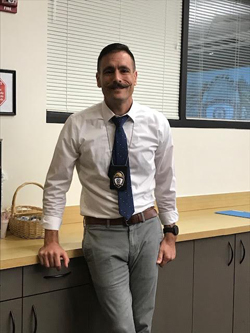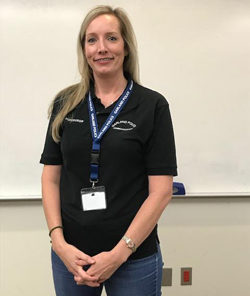In the eighth week of the Garland Citizens Police Academy, Katie Mayfield, supervisor in Communications shared information about the 911 system and operators and Pastor Mark Clements, talked about what it’s like to be the GPD chaplain. We also watched a heart-wrenching video, “Heroes Behind the Badge,” that told the stories of several law enforcement officers who had died in the line of duty. One of the statistics from the film that really stood out to me is that a law enforcement officer in America is killed every 54 hours. This is incomprehensible.
Communications
Mayfield wanted to be in Communications from the age of 16 when her mother began working as a 911 operator. At 19, she landed a job with GPD in Communications. Several family members, in addition to her mother, work in law enforcement and her daughter is a Marine.
“It’s all about service in my family,” Mayfield said.
AT&T announced the start of 911 service in 1968 and the first call was in Haleyville, Alabama. Texas got 911 service in April 1970. Incredible capabilities have been added since then.
The telephone system recognizes 911 calls and routes them appropriately, but there is a difference between calls from landlines and those from cell phones. When a call is received from a landline, the system provides the address. Calls from cell phones, which account for 76 percent of calls, do not provide an exact location, which is the most critical information.
The information provided to the operator is critical. Where are you? What is going on? Are there weapons? What kind? When did the incident occur?
“Our main concern is the safety of the citizens and first responders,” Mayfield said.
She added that the most effective way to ensure safety is for everyone to have the most current, accurate information possible. The ability to multi-task is paramount. Operators must have the ability to receive information from callers, search for additional necessary information and keep everyone, especially police and fire personnel, updated on the situation by entering the latest data on the computer.
Operators are also often required to give instructions on CPR and the Heimlich maneuver when necessary.
The stress is more than most of us could handle. Mayfield shared a complicated and disturbing recording of a call from a woman who had shot her husband. Her behavior was erratic and the patience demonstrated by the operator was beyond belief. Mayfield believes that part of that patience is learned through their extensive training and part is inherent.
Applicants must go through psychology testing, a polygraph test and a full background check.
Chaplain

Clements, who is the senior pastor of New Liberty Baptist Church in Garland, serves as the GPD chaplain. In this volunteer position, he offices at the police station and makes it a point to be there and available to anyone who needs his help. The hours are long but he enjoys the job.
“Being a police officer is one of the hardest jobs out there,” he said. “Our officers are asked to do so much and it gets more and more difficult as time goes by.”
Clements stepped in as GPD chaplain after the retirement of Pastor Ken Ashlock, who began in 1962 as the department’s first official chaplain. Ashlock, who passed away in 2018, trained Clements for the volunteer position.
“I’m trying to walk in his shoes, but they are huge, huge shoes,” Clements said. “We owe him a great debt of gratitude.
The chaplain’s duties include:
- Provide confidential pastoral presence, encouragement, prayer, friendship
- Be a confidant to GPD in times of distress, illness and death
- Provide the services of an ordained minister and access to spiritual guidance
- Provide ministerial presence for the community during emergencies
- Make next of kin death notifications
“Mostly, it’s just to be there,” Clements said. “Police work is physical, mental and emotional warfare, but it’s also spiritual warfare.”
He emphasized that he is not there to preach about Christianity, but jokingly added that he does not turn down the occasional opportunity.
Clements shared that law enforcement officers witness an average of 188 traumatic critical incidents in their careers and there is a high incidence of post-traumatic stress disorder, depression and marital problems. The suicide rate among officers is high.
He added that confidentiality is very important and anything the officers say to him stays with him.
“Our officers are doing the Lord’s work. I really believe that,” Clements said.


